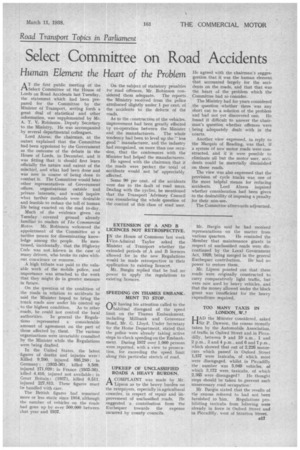Road Transport Topics in Parliament
Page 51

If you've noticed an error in this article please click here to report it so we can fix it.
Select Committee on Road Accidents
Human Element the Heart of the Problem AT the first public meeting of the Select Committee of the House of Lords on Road Accidents last Tuesday, the statement which had been prepared for the Committee by the Minister of Transport, setting forth a great deal of statistical and other information, was supplemented by Mr. A. T. V. Robinson. Deputy Secretary to the Ministry. He was accompanied by several departmental colleagues.
Lord Alness, the chairman, at the outset explained that the Committee had been appointed by the Government as the outcome of the debate in the House of Lords, in December, and it was fitting that it should first learn officially the nature and extent of the mischief, and what had been done and was now in course of being done to combat it. The Committee would hear other representatives of Government offices, organizations outside and private interests, and would inquire what further methods were desirable and feasible to reduce the toll of human life being exacted on the road to-day.
Much of the evidence given on Tuesday covered ground already familiar to readers of The Commercial Motor. Mr. Robinson welcomed the appointment of the Committee as a further means for disseminating knowledge among the people. He mentioned, incidentally, that the Highway Code was not. known in the case of many drivers, who broke its rules without con-xience or remorse.
A high tribute was paid to the valuable work of the mobile police, and importance was attached to the work that they might do in greater measure in future.
On the question of the condition of the roads in relation to accidents he said the Minister hoped to bring the trunk roads now under his control up to the highest condition. As to other roads, he could not control the local authorities. In general the Regula tions represented a considerable amount of agreement on the part of those affected by thent. The various organizations were invariably consulted by the Minister while the Regulations were being drafted.
In the United States, the latest figures of deaths and injuries were:
Killed 9,7.00, injured 895,280; in Germany (1935-36), killed 8,509, injured 171,020: in France (1935-36), killed 4,416, injured not available: in Great Britain.: (1937). killed 6,511, injured 227,813. These figures must he handled with care.
The British figures had remained more or less static since 1934, although the number of vehicles on the roads had gone up by over 500,000 between that year and 1937. On the subject of statutory penalties Inc road offences, Mr. Robinson considered them adequate. The reports the Ministry received from the police attributed slightly under 1 per cent. of the accidents to the defects of the roads.
As to the construction of the vehicles. improvement had been greatly effected by co-operation between the Minister
and the manufacturers. The whole tendency had been to level up the "less good" manufacturer, and the industry had recognized, on more than one occasion, that the conferences with the Minister had helped the manufacturers.
He agreed with the chairman that if the roads were perfect the total of accidents would not be' appreciably affected.
Some 90 per cent. of the accidents were due to the fault of road users. Dealing with the cyclist, he mentioned that the Transport 'Advisory Council was considering the whole question of the control of this class of road user. He agreed with the chairman's suggesgestion that it was the human element that accounted largely for the accidents on the roads, and that that was the heart of the problem which the Committee had to consider.
The Ministry, had for years considered the question whether there was any short cut to a solution of the problem and had not yet discovered one. He found it difficult to answer the chairman's question whether offences were being adequately dealt with in the courts.
Another view expressed, in reply to the Marquis of Reading, was that, if a system of new motor roads were constructed, and if it were possible to eliminate all but the motor user, accidents .could be materially diminished on those roads.
The view was also expressed that the provision of cycle tracks was one of the most helpful means for reducing accidents. Lord Alness inquired whether consideration had been given to the desirability of imposing a penalty for their. non-use.
The Committee afterwards adjourned.
















































































